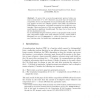Free Online Productivity Tools
i2Speak
i2Symbol
i2OCR
iTex2Img
iWeb2Print
iWeb2Shot
i2Type
iPdf2Split
iPdf2Merge
i2Bopomofo
i2Arabic
i2Style
i2Image
i2PDF
iLatex2Rtf
Sci2ools
140
Voted
EUROCRYPT
2006
Springer
2006
Springer
Composition Implies Adaptive Security in Minicrypt
To prove that a secure key-agreement protocol exists one must at least show P = NP. Moreover any proof that the sequential composition of two non-adaptively secure pseudorandom functions is secure against at least two adaptive queries must falsify the decisional Diffie-Hellman assumption, a standard assumption from public-key cryptography. Hence proving any of this two seemingly unrelated statements would require a significant breakthrough. We show that at least one of the two statements is true. To our knowledge this gives the first positive cryptographic result (namely that composition implies some weak adaptive security) which holds in Minicrypt, but not in Cryptomania, i.e. under the assumption that oneway functions exist, but public-key cryptography does not.
Cryptology | Decisional Diffie-Hellman Assumption | EUROCRYPT 2006 | Public-Key Cryptography | Secure Pseudorandom Functions |
Related Content
| Added | 22 Aug 2010 |
| Updated | 22 Aug 2010 |
| Type | Conference |
| Year | 2006 |
| Where | EUROCRYPT |
| Authors | Krzysztof Pietrzak |
Comments (0)

